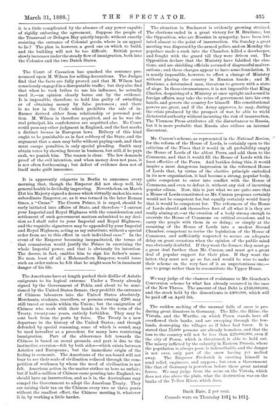It is apparently etiquette in Berlin to announce every morning
that, though the Emperor did not sleep well, his general health is decidedly improving. Nevertheless, on March 21st his Majesty signed a decree which virtually makes his son a subordinate Emperor, or, as it was termed in the later Roman times, a "Caesar." The Crown Prince, it is urged, should be early initiated into affairs of State, and therefore "I entrust your Imperial and Royal Highness with the consideration and settlement of such government matters submitted to my deci- sion as I shall refer to your Imperial and Royal Highness ; and the requisite signatures may be appended by your Imperial and Royal Highness, acting as my substitute, without a special order from me to this effect in each individual case." In the event of the Emperor becoming incapacitated, the terms of that commission would justify the Prince in exercising the whole Imperial power, and that is obviously its intention. The decree, in fact, enables him to sign his father's name. No man, least of all a Hohenzollern Emperor, would issue such an order unless he felt that he might soon be in imminent danger of his life.


































 Previous page
Previous page